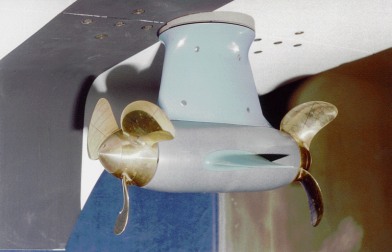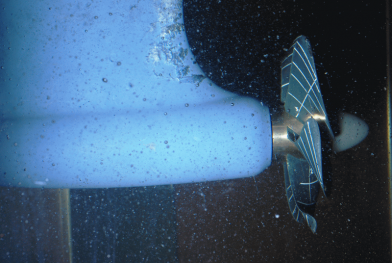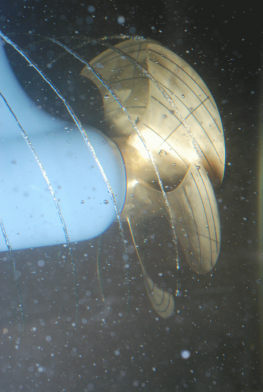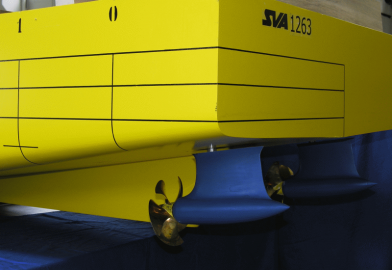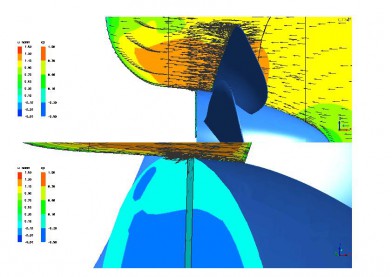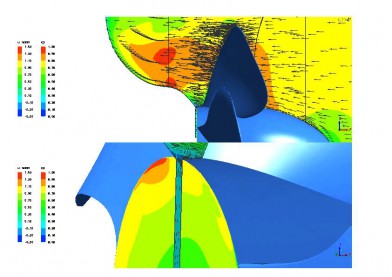The podded drive is a propulsion system comprised of the components propellers and pod housing. The development and optimisation of podded drives requires knowledge of the interaction between propeller and pod housing and about the influence of design parameters on the characteristics of the system.
SVA Potsdam has been working in the field of podded drives since 1995 [1], [2]. Among other studies, the applicability of podded drives, dynamic flow calculations, analyses of various podded drives as well as numerous model studies have been performed there [3], [4], [8]. Developments for podded drives were conducted in collaboration with various manufacturers [3], [9].
As part of a BMWi funded project “Integrated Ship Design for Ships with Podded Propulsion Systems”, aspects of ship design for ships with podded drives were examined. In the BMWi funded project “High-Speed Pod”, concepts for podded drives with application speeds up to 30 knots were developed and studied experimentally and computationally [5], [6]. The ideas and findings resulting from these projects were the basis for the development of High Efficiency Pods with HTS technology [9].
The manoeuvrability of propulsion systems with podded drives were examined as part of a BMBF funded project [7]. The arrangement of the pod at the stern of the ship, the use of fins, and the influence of the propeller assembly were analysed experimentally and computationally.
Standard podded drives with pull and push propeller variants have been developed and investigated experimentally [6], [8], [9]. The pod housings (gondolas) were particularly varied with regard to the gondola diameter and the transition from the propeller to the gondola in order to determine the influence of geometric parameters on the characteristics of podded drives (open water, propulsion, cavitation).
The development and the study of podded drives places high demands on measurement technology and experimental methods. For open water, propulsion and cavitation measurements, manoeuvring and speed measurement systems on podded drives have been developed, tested and used successfully. To validate the evaluation and forecasting methods for measurements with podded drives, CFD calculations were performed.
With the available azimuth measuring systems for podded drives, pull, push, twin, and counter-rotating propeller assemblies can be analysed. Among other things, the thrusts and moments of the propeller are measured in the shaft and the lateral and vertical forces can be measured at the housing.
Context Related References / Research Projects
[1] Heinke, H.-J.: Azimuthing propulsion – Experiences of SVA, 6th SVA-Forum “Azimuthing Propulsion – new challenges and chances”, Potsdam, 29th April 1998
[2] Abdel-Maksoud, M., Heinke, H.-J.: Investigation of Viscous Flow Around Modern Propulsion Systems, CFD ’99, The International CFD Conference, 5-7 June 1999, Ulsteinvik
[3] Kaul, S., Heinke, H.-J.; Abdel-Maksoud, M.: Hydrodynamische Optimierung von Podded Drives und aktuelle Anwendungen in der Großausführung, 54. Sitzung des FA „Schiffshydrodynamik“ der STG, Hamburg, September 2000
[4] Heinke, H.-J.: Kavitationsuntersuchungen zu Podded Drives, 20. Strömungstechnische Tagung des Instituts für Strömungsmechanik der TU Dresden, 6. Oktober 2000
[5] Heinke, H.-J.: Alternative Propulsion Concepts for Fast Navy Ships, Part II: Podded drives for navy ships, International Lecture Day “Unconventional Hull Forms for Naval Vessels”, Potsdam, September 2001
[6] Heinke, C., Heinke, H.-J.: Investigations about the Use of Podded Drives for Fast Ships, FAST 2003, Ischia (Italy), Oct. 2003
[7] Steinwand, M.: Manoeuvrability of a Single Screw Ship with Pod, Hydronav’2003, Gdansk, Poland, Oct. 2003
[8] Heinke, H.-J.: Investigations about the forces and moments at podded drives, First International Conference on Technological Advances in Podded Propulsion, Newcastle, UK, April 2004
[9] Heinke, H.-J.: Hydrodynamische Untersuchungen für einen Podded Drive mit HTS-Synchronmaschine, Statustagung Schifffahrt und Meerestechnik, Bundesministerium für Wirtschaft und Technologie, 3. Dezember 2009, Rostock-WaPartner
